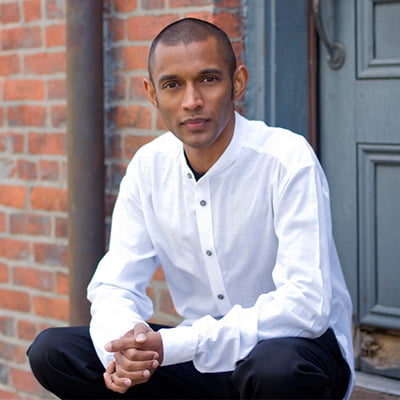
Dinuk Wijeratne delves into identity through musical improvisation and composition
Dinuk Wijeratne stumbled upon a collection of Mozart recordings at the age of 12. Raised in a musically inclined family, Dinuk admits he was likely only attracted to the colour of the album cover, but the experience changed the trajectory of his interest in music. He remembers listening to the piano concerto and thinking, this is it. “I usually describe it as the first spiritual experience before I knew about religion,” Dinuk says. “I remember thinking, whatever this is, I’d like to get close to it.” In this article, we’ll dive into Dinuk’s experience as a multi-award winning conductor, composer, and pianist, and how he combines cultural diversity to achieve a personal sense of balance and identity through boundary-crossing music.
A fire is ignited
After being blown away by the Mozart collection, Dinuk began to read about the history of composers and the ways they were creating music. From then on, he began composing original music and playing the piano more seriously. Born in Sri Lanka, Dinuk grew up in Dubai, where he trained as a western classical musician. His compositions are steeped in the influences of Middle Eastern and South Asian culture, conveyed through western forms of expression like writing for orchestras. Dinuk completed his studies in the United Kingdom and New York before moving to Canada about 15 years ago.
Finding an equilibrium in cultural diversity
Though Dinuk’s career is primarily as a concert composer, he is passionate about improvisation, an experience he’ll be presenting at his third year at Chamberfest this summer. He describes his music as an intersection of cultures, influenced by an eclectic mix from Sri Lanka, India, and the Middle East. “I’m using music to find a cultural balance that one wants to live, and to explore identity that way,” Dinuk says. “I’m also fascinated by the boundary of improvisation and what’s written—essentially where we find freedom in music.”
Exploring the self through creation
Deeply passionate about access to music, Dinuk believes musical literacy is a useful and necessary skill for everyone, regardless of if you’re a professional musician. He extolls the importance of musical discovery for both young people and artists, as a means to explore and navigate their own unique identities in an increasingly complex and globalized environment. “I think that’s why we consume art, and why we create art,” he says. “We’re searching for identity, we’re searching for a sense of balance that we can’t find in a very difficult world.” Originally drawn to Chamberfest because of the people, Dinuk finds the mission and cultural diversity of the festival refreshing. It’s ultimately what keeps him coming back. Chamberfest presents a large umbrella of expression under western classical music, which Dinuk leverages as a vehicle for synthesizing the disparate identities that his upbringing and its diverse influences have created.
Paving the way for the next generation of musicians
As the Artistic Director of the University of Ottawa Orchestra and Assistant Professor of Orchestral Studies, Dinuk encourages his students and every young artist to think of music unrestrictedly, as a blank canvas on which they can tell their story. In response to the social movements of 2020, he sees the passion and energy from a younger generation who want to see music reflecting society, putting necessary pressure on the arts. Dinuk feels Chamberfest is very open to this mindset, demonstrated by performances immersed in history paired alongside experimental and exploratory projects, creating an environment for the audience and music to rub shoulders. “On any given day I never feel fully western or fully eastern,” he says. “But if I create a piece of music, I can find that balance for a split second, or a moment, that I’m trying to find identity-wise.”








Recent Comments